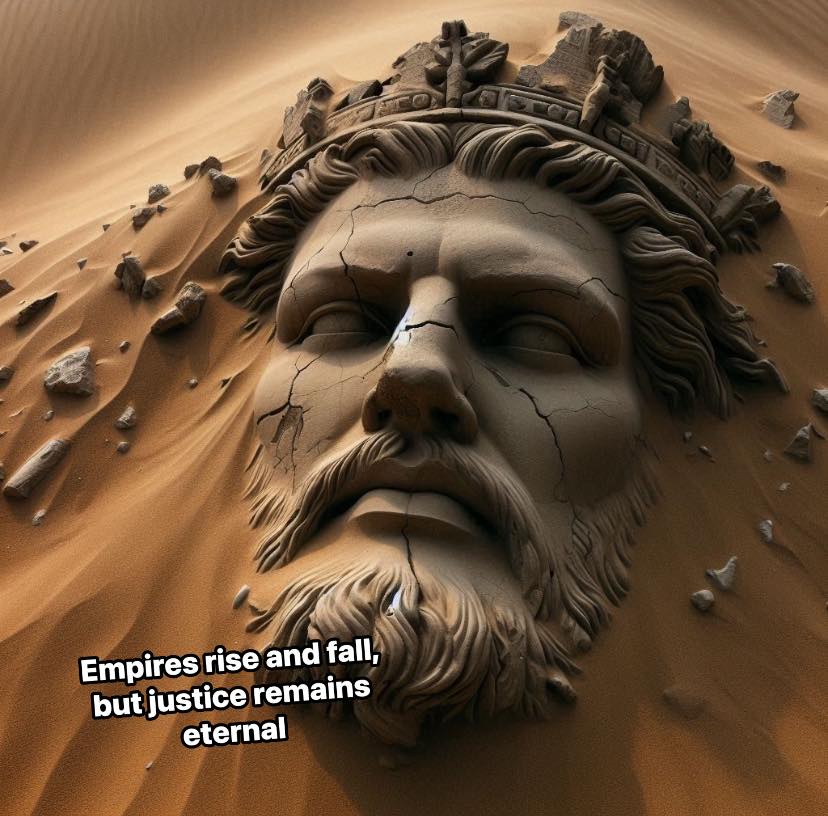
Kavi observed that humanity, despite its intellectual progress, remains trapped in a cycle of repeating the very actions it once vowed never to commit again. Nations, after experiencing the horrors of conquest and occupation, pledge to uphold sovereignty—yet invasions persist under new pretexts. Leaders denounce historical genocides while crafting policies that systematically erase entire cultures. Economic hegemonies of the past, once denounced as exploitative, return in modern forms—disguised as “economic partnerships” that entrench dependency rather than mutual growth.
History, it seems, is not a linear progression of enlightenment but an oscillation between moral awakening and willful amnesia. Even as international laws attempt to curb such transgressions, power-hungry individuals and nations continue to test the limits of these laws, exploiting loopholes or simply disregarding them. It is as if these actors remain unaware of the era they live in—blind to both the lessons of history and the broader divine orchestration of human existence.
The Divine Plan and Human Free Will
The Almighty God, in His omniscience, never intended to create a utopia on Earth but rather to cultivate ideal individuals within the chaos of free will. The Almighty granted humans the absolute freedom to choose between justice and injustice, integrity and corruption. This freedom is not revoked even when it leads to the darkest manifestations of human nature—war, tyranny, genocide, and economic subjugation. Instead, divine guidance weaves itself through history, ensuring that even in times of moral collapse, those with spiritual and ethical strength emerge to challenge oppression.
Yet, many fail to grasp the deeper workings of this divine plan. They assume that historical solutions—however flawed—can be reapplied to contemporary problems. But history does not repeat itself in form, only in principle. The colonizers of the past wielded muskets and flags, while today’s economic empires control nations through debt and resource dependencies. The genocides of today are not always carried out with machetes and gas chambers but through calculated policies of erasure—economic strangulation, forced assimilation, or the destruction of cultural identity. The injustice remains the same, but the methods evolve.
The Balance of Nations and the Prevention of Absolute Domination
If humanity had been left to its own devices, one nation might have risen to enslave the rest of the world. But God, in His wisdom, structured human affairs to prevent absolute dominance. He ensured that no single empire would sustain unchallenged supremacy, embedding interdependence into the fabric of nations. No matter how powerful a nation becomes, it will always rely on others for resources, technology, or alliances. Yet, some nations and leaders refuse to acknowledge this reality, attempting to recreate the hegemonies of the past without realizing that global consciousness has shifted. The tools of suppression have changed, but so too have the means of resistance.
This divine orchestration is not new; it is a recurring pattern in history. The story of Moses, as mentioned in verses 20:38-20:43 of the Quran, serves as a timeless example of how the Almighty’s plan unfolds beyond human schemes. Pharaoh, in his arrogance, sought to eliminate every newborn Israelite boy, fearing that one might grow up to challenge his rule. He commanded mass infanticide, believing he could extinguish any future threat. Yet, in his very own palace, the one whom he feared—Moses—was raised under his care, nurtured and protected by the very system that sought his destruction. Pharaoh planned, and the Almighty planned, and He is the best of planners.
Tyrants rise, believing they can control destiny, suppress resistance, and shape the world according to their will. But history is filled with their failures. The most powerful empires, despite their might, have fallen when they overstepped the limits of divine justice. The same Pharaoh who sought to kill every newborn Israelite would later drown in the sea, undone by his own arrogance. His attempt to dominate absolutely only led to his inevitable downfall.
Today, nations and leaders who seek to impose their will upon the world—whether through military force, economic coercion, or political manipulation—fail to recognize this divine orchestration. The balance of power shifts, empires rise and fall, and no dominion remains eternal. The Almighty allows the unjust to plot and plan, but His plan is always greater. He ensures that no oppression remains unchallenged and that, in every era, a Moses will emerge to challenge the Pharaohs of the time.

This is the unseen law that governs human affairs. Even in the darkest times, when injustice seems unshakable, history reminds us that no empire, no tyrant, and no oppressive system is beyond the reach of divine justice. The Almighty does not immediately strike down oppressors, but He ensures that their power never becomes absolute—and that their downfall is woven into the very fabric of their ambitions.
The Test of Power and Leadership
Political power is not a privilege but a trial. A true leader does not impose personal whims as law but governs with fairness, understanding that authority is a trust placed upon them, not a right they inherently possess. Yet, too often, rulers succumb to the temptations of unchecked power, mistaking dominance for legitimacy. The test of leadership is not in how much control one can exert but in how much justice one can uphold.
History is not just a record of human actions but a mirror reflecting the choices we continue to make. The failure to recognize past mistakes does not merely doom us to repeat them—it proves that we never truly understood them in the first place. The question is not whether humanity will continue to fall into cycles of conflict and oppression. The question is whether, in each era, there will be enough people with the wisdom to break free from these cycles, understanding that the solution to every present challenge must come from the present itself—not from the recycled justifications of the past.
And so, the Divine test continue.

